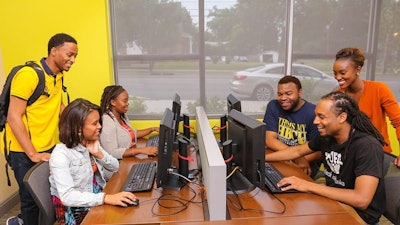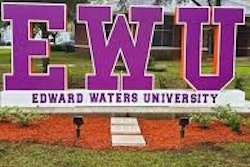
“I was so excited when I heard the news because it made me stand up and say okay, people realize there is a deficit among HBCUs regarding online learning,” said Dr. Patrice Glenn Jones, executive director of online education and programs at Alabama State University, a public HBCU. “To have UNCF, a nationally recognized organization, do this is pivotal for connecting private HBCUs. We are much stronger when we work together, particularly HBCUs.”
UNCF is a national philanthropic organization that funds scholarships for Black students and general scholarship funds for 37 private HBCUs. Deloitte Digital is a creative strategy, digital, and technology consulting company.
UNCF received more than $10 million to fund the HBCUv initiative from the Karsh Family Foundation, Lilly Foundation, Citi Foundation, Bill & Melinda Gates Foundation, and Bank of America Charitable Foundation. Yet UNCF has stated there remains a need for additional funding to expand HBCUv’s reach.
“With HBCUs, we have a group of institutions that punch above their weight, that do a better job of serving low-income and underserved students, but they haven’t been given a chance to innovate like other colleges,” said Julian Thompson, director of strategy at UNCF and part of the team leading HBCUv. “What we hope to do with HBCUv is give the leaders of these institutions the time and energy for new ideas to emerge in these spaces to help students succeed. I’m really excited about that.”
The remote learning hub will let students take courses for credit and connect with fellow students and faculty at participating HBCUs. Beginning next year, nine private HBCUs with about 8,000 students will join a pilot version of HBCUv. Synchronous and synchronous learning options will be available to students. Instructors will also be able to get predictive analytics on student performance and track students’ progress.
“One of the single biggest opportunities unlocked by HBCUv will be the connection of all the HBCU campuses,” said Nathan Young, head of strategy at Ethos, the Deloitte Digital team working with UNCF on the learning hub. “What happens when you take entrepreneurial spirits from one HBCU to meet those at another? How many more Black startups will be founded? How many more lifelong relationships will be nourished? How many more opportunities will be created to lift each other up that wouldn’t be possible with the physical limits of the campus?”
The first nine HBCUs include Benedict College, Claflin University, Clark Atlanta University, Dillard University, Jarvis Christian College, Johnson C. Smith University, Lane College, Shaw University, and Talladega College. Yet Thompson said 21 of UNCF’s 37 member institutions expressed interest in the pilot. The nine selected represent varying geographies and institutional sizes for a diverse initial cohort.
HBCUv will additionally offer courses taught by renowned Black scholars in a range of subjects, including Black history and U.S. race relations. Through the platform, students will eventually be able to finish fully online degree programs.
Both Young and Thompson stressed that HBCUv aims to also translate the unique culture of HBCUs into the virtual space. To do so, UNCF has logged more than 3,300 hours from speaking with HBCU faculty, staff, and students to ensure the new framework meets their needs.
“Adding the HBCU flavor to this online platform is what I’m really excited about—and creating this space as a high-touch point for students,” said Dr. Valora Richardson, director of digital solutions and innovation at UNCF. “In my years of working in academic technology, I’ve never known of an implementation that actually involved the perspectives of the learners so heavily. This is a first.”
When colleges pivoted online at the start of the pandemic, Glenn Jones noted many HBCUs did not have a robust online infrastructure in place, largely due to decades of underfunding compared to predominantly white institutions. Low-income students also often lacked reliable access to broadband. And, as Thompson pointed out, with HBCUs educating many poor students, that digital divide became yet another concern for HBCUs adapting to online education.
To Glenn Jones, such challenges make embracing online learning–and HBCUv—even more critical for HBCUs nationwide.
“Now my question is, who’s going to do this among the public HBCUs?” she said, noting there are more public than private HBCUs. “Even if our mission is an old mission, we need to consider who we are in 2022 and make necessary adjustments to prepare students for beyond 2022.”
Rebecca Kelliher can be reached at [email protected].



















